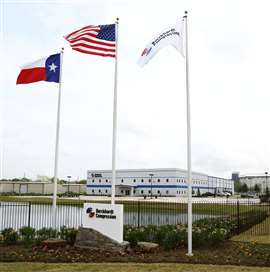Burckhardt, Engie sign renewable energy agreement
July 02, 2024
Four-year agreement seeks to decarbonize operations across U.S.
Burckhardt Compression (US), Inc., announced the signing of a four-year renewable energy agreement with energy company Engie to decarbonize operations at its locations across the U.S. The compression specialist will purchase the equivalent of 4,656,000 KW/h of renewable energy, reported to save 1,941 metric tons of carbon dioxide emissions.
 Burckhardt Compression (US), Inc., has signed a four-year renewable energy agreement with Engie to decarbonize operations at its locations nationwide. (Photo: Burckhardt Compression)
Burckhardt Compression (US), Inc., has signed a four-year renewable energy agreement with Engie to decarbonize operations at its locations nationwide. (Photo: Burckhardt Compression)
The move is part of Burckhardt Compression’s sustainability roadmap, which is an integrated part of its Mid-Range Plan (MRP) 2027, with ambitious targets for each material topic. The company noted that its compressor solutions already play a critical role in building a viable commercial ecosystem for the supply of zero-emission green hydrogen fuel. The agreement with Engie further supports its commitment to tackle climate change and drive the energy transition, the company added, and is another step on its path towards reaching operational net-zero emissions by 2035.
“Our purpose is to provide leading compression solutions for a sustainable energy future,” said Rob Leger, director, QEOHS at Burckhardt Compression (US), “and we have committed to reduce our greenhouse gas emission intensity by 50% in 2027 compared to 2021.
Under the agreement, emissions reductions are guaranteed by renewable energy attribute certificates, which are issued to producers for every 1 MW/h of clean power they supply to the grid. Companies can purchase these certificates as energy credits, offsetting power consumption and emissions from other sources. All renewable energy sources are traceable, with Burckhardt Compression purchasing 100% clean power from the 300-MW capacity Priddy Wind Farm in Texas.
“By partnering with Engie, we have moved from purchasing a grid mix from unknown electricity sources to now having renewable energy at all our U.S. locations traceable to a specific 100% renewable source. We will save the equivalent carbon emissions of driving 4,964,504 miles in an average gasoline car or from consuming 4,494 barrels of oil,” Amy Woodward, QEOHS Administrator at Burckhardt Compression (US), pointed out.
Further sustainability initiatives at Burckhardt Compression are ongoing, including improving the efficiency of its vehicle fleet and surveying areas for LED lighting at its facilities. The company said it will also continue to develop cutting-edge compression technologies to support the global transition to renewable energy.
“Decarbonizing operations takes long-term planning, but with our 180-year heritage, this is something we’re good at,” said Leger. “I’m looking forward to transparently sharing our progress with our customers and stakeholders going forward.”
MAGAZINE
NEWSLETTER
CONNECT WITH THE TEAM






